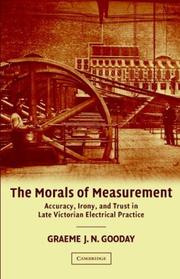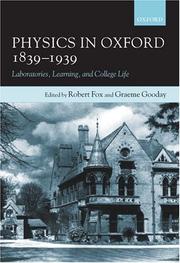| Listing 1 - 10 of 16 | << page >> |
Sort by
|

ISBN: 0511550693 0521430984 0521187567 Year: 2004 Publisher: Cambridge : Cambridge University Press,
Abstract | Keywords | Export | Availability | Bookmark
 Loading...
Loading...Choose an application
- Reference Manager
- EndNote
- RefWorks (Direct export to RefWorks)
The Morals of Measurement is a contribution to the social histories of quantification and electrical technology in nineteenth-century Britain, Germany and France. It shows how the advent of commercial electrical lighting stimulated the industrialization of electrical measurement from a skilled labour-intensive activity to a mechanized practice. Challenging traditional accounts that focus on the metrological standards used in measurement, this book shows the central importance of trust when measurement was undertaken in an increasingly complex division of labour. Alongside ambiguities about the very nature of measurement and the respective responsibilities of humans and technologies in generating error-free numbers, the book also addresses controversies over the changing identity of the measurer through the themes of body, gender and authorship. The reader will gain fresh insights into a period when measurement was widely treated as the definitive means of gaining knowledge of the world.
Electric lighting --- Electric measurements --- Measurements, Electric --- Electromagnetic measurements --- Frequencies of oscillating systems --- Physical measurements --- Weights and measures --- Electronic measurements --- Electric light --- Light, Electric --- Light sources --- Lighting --- Electric lamps --- Neon lamps --- History --- Measurement --- Arts and Humanities
Book
ISBN: 9781851969753 Year: 2016 Publisher: London Routledge
Abstract | Keywords | Export | Availability | Bookmark
 Loading...
Loading...Choose an application
- Reference Manager
- EndNote
- RefWorks (Direct export to RefWorks)
History of civilization --- History of the United Kingdom and Ireland --- anno 1800-1899 --- anno 1900-1909 --- anno 1910-1919
Book
ISBN: 082298170X 1317314018 1315652757 1317314026 1281773190 9786611773199 1851965807 Year: 2008 Publisher: London : Pickering & Chatto,
Abstract | Keywords | Export | Availability | Bookmark
 Loading...
Loading...Choose an application
- Reference Manager
- EndNote
- RefWorks (Direct export to RefWorks)
A socio-cultural study of the history of electricity during the late Victorian and Edward periods. It shows how technology, authority and gender interacted in pre-World War I Britain.
Electricity --- Electric utilities --- History --- Social aspects --- 1800-1999
Book
ISBN: 9780262019033 9780262313414 0262313413 0262019035 Year: 2013 Publisher: Cambridge (Mass.) : MIT Press,
Abstract | Keywords | Export | Availability | Bookmark
 Loading...
Loading...Choose an application
- Reference Manager
- EndNote
- RefWorks (Direct export to RefWorks)
Patent laws and legislation --- Patent suits --- Electric apparatus and appliances --- Inventors --- History --- Patents. --- Legal status, laws, etc. --- History. --- Patents --- Legal status, laws, etc
Book
ISBN: 1137406879 1137406860 Year: 2017 Publisher: London : Palgrave Macmillan UK : Imprint: Palgrave Pivot,
Abstract | Keywords | Export | Availability | Bookmark
 Loading...
Loading...Choose an application
- Reference Manager
- EndNote
- RefWorks (Direct export to RefWorks)
This book looks at how hearing loss among adults was experienced, viewed and treated in Britain before the National Health Service. We explore the changing status of ‘hard of hearing’ people during the nineteenth century as categorized among diverse and changing categories of ‘deafness’. Then we explore the advisory literature for managing hearing loss, and techniques for communicating with hearing aids, lip-reading and correspondence networks. From surveying the commercial selling and daily use of hearing aids, we see how adverse developments in eugenics prompted otologists to focus primarily on the prevention of deafness. The final chapter shows how hearing loss among First World War combatants prompted hearing specialists to take a more supportive approach, while it fell to the National Institute for the Deaf, formed in 1924, to defend hard of hearing people against unscrupulous hearing aid vendors. This book is suitable for both academic audiences and the general reading public. All royalties from sale of this book will be given to Action on Hearing Loss and the National Deaf Children’s Society.
Great Britain --- History. --- England --- History --- Medicine. --- Great Britain-History. --- People with disabilities. --- History, Modern. --- History of Science. --- History of Medicine. --- History of Britain and Ireland. --- Disability Studies. --- Modern History. --- Modern history --- World history, Modern --- World history --- Cripples --- Disabled --- Disabled people --- Disabled persons --- Handicapped --- Handicapped people --- Individuals with disabilities --- People with physical disabilities --- Persons with disabilities --- Physically challenged people --- Physically disabled people --- Physically handicapped --- Persons --- Disabilities --- Sociology of disability --- Clinical sciences --- Medical profession --- Human biology --- Life sciences --- Medical sciences --- Pathology --- Physicians --- Annals --- Auxiliary sciences of history --- Health Workforce --- Medicine—History. --- Great Britain—History.

ISBN: 9780521430982 9780511550690 9780521187565 Year: 2004 Publisher: Cambridge Cambridge university press
Abstract | Keywords | Export | Availability | Bookmark
 Loading...
Loading...Choose an application
- Reference Manager
- EndNote
- RefWorks (Direct export to RefWorks)
Digital
ISBN: 9781137406866 Year: 2017 Publisher: London Palgrave Macmillan UK :Imprint: Palgrave Pivot
Abstract | Keywords | Export | Availability | Bookmark
 Loading...
Loading...Choose an application
- Reference Manager
- EndNote
- RefWorks (Direct export to RefWorks)
This book looks at how hearing loss among adults was experienced, viewed and treated in Britain before the National Health Service. We explore the changing status of ‘hard of hearing’ people during the nineteenth century as categorized among diverse and changing categories of ‘deafness’. Then we explore the advisory literature for managing hearing loss, and techniques for communicating with hearing aids, lip-reading and correspondence networks. From surveying the commercial selling and daily use of hearing aids, we see how adverse developments in eugenics prompted otologists to focus primarily on the prevention of deafness. The final chapter shows how hearing loss among First World War combatants prompted hearing specialists to take a more supportive approach, while it fell to the National Institute for the Deaf, formed in 1924, to defend hard of hearing people against unscrupulous hearing aid vendors. This book is suitable for both academic audiences and the general reading public. All royalties from sale of this book will be given to Action on Hearing Loss and the National Deaf Children’s Society.
Social policy and particular groups --- Pure sciences. Natural sciences (general) --- History of human medicine --- Human medicine --- History --- History of the United Kingdom and Ireland --- History of Eastern Europe --- wetenschapsgeschiedenis --- personen met een beperking --- geneeskunde --- geschiedenis --- Europese geschiedenis --- kinderen met een beperking
Book
ISBN: 0822987317 9780822987314 9780822945956 0822945959 Year: 2020 Publisher: Pittsburgh, Pa.
Abstract | Keywords | Export | Availability | Bookmark
 Loading...
Loading...Choose an application
- Reference Manager
- EndNote
- RefWorks (Direct export to RefWorks)
Sir Oliver Lodge was a polymathic scientific figure who linked the Victorian Age with the Second World War, a reassuring figure of continuity across his long life and career. A physicist and spiritualist, inventor and educator, author and authority, he was one of the most famous public figures of British science in the late nineteenth and early twentieth centuries. A pioneer in the invention of wireless communication and later of radio broadcasting, he was foundational for twentieth-century media technology and a tireless communicator who wrote upon and debated many of the pressing interests of the day in the sciences and far beyond. Yet since his death, Lodge has been marginalized. By uncovering the many aspects of his life and career, and the changing dynamics of scientific authority in an era of specialization, contributors to this volume reveal how figures like Lodge fell out of view as technical experts came to dominate the public understanding of science in the second half of the twentieth century. They account for why he was so greatly cherished by many of his contemporaries, examine the reasons for his eclipse, and consider what Lodge, a century on, might teach us about taking a more integrated approach to key scientific controversies of the day.
Scientists --- Lodge, Oliver, --- United Kingdom --- Great Britain

ISBN: 9780198567929 Year: 2009 Publisher: Oxford Oxford university press
Abstract | Keywords | Export | Availability | Bookmark
 Loading...
Loading...Choose an application
- Reference Manager
- EndNote
- RefWorks (Direct export to RefWorks)
Physics --- Study and teaching (Graduate) --- History --- Study and teaching (Higher) --- University of Oxford --- History.
Book
ISBN: 0262313421 Year: 2013 Publisher: Cambridge, Mass. : MIT Press,
Abstract | Keywords | Export | Availability | Bookmark
 Loading...
Loading...Choose an application
- Reference Manager
- EndNote
- RefWorks (Direct export to RefWorks)
Late nineteenth-century Britain saw an extraordinary surge in patent disputes over the new technologies of electrical power, lighting, telephony, and radio. These battles played out in the twin tribunals of the courtroom and the press. In Patently Contestable, Stathis Arapostathis and Graeme Gooday examine how Britain's patent laws and associated cultures changed from the 1870s to the 1920s. They consider how patent rights came to be so widely disputed and how the identification of apparently solo heroic inventors was the contingent outcome of patent litigation. Furthermore, they point out potential parallels between the British experience of allegedly patentee-friendly legislation introduced in 1883 and a similar potentially empowering shift in American patent policy in 2011. After explaining the trajectory of an invention from laboratory to Patent Office to the court and the key role of patent agents, Arapostathis and Gooday offer four case studies of patent-centered disputes in Britain. These include the mostly unsuccessful claims against the UK alliance of Alexander Graham Bell and Thomas Edison in telephony; publicly disputed patents for technologies for the generation and distribution of electric power; challenges to Marconi's patenting of wireless telegraphy as an appropriation of public knowledge; and the emergence of patent pools to control the market in incandescent light bulbs.
Patent laws and legislation --- Patent suits --- Electric apparatus and appliances --- Inventors --- History. --- History --- Patents. --- Legal status, laws, etc. --- SCIENCE, TECHNOLOGY & SOCIETY/History of Technology --- INFORMATION SCIENCE/Technology & Policy --- SOCIAL SCIENCES/Political Science/Public Policy & Law
| Listing 1 - 10 of 16 | << page >> |
Sort by
|

 Search
Search Feedback
Feedback About UniCat
About UniCat  Help
Help News
News